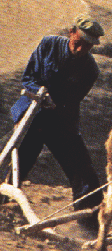

|
+++ CHINA INDEX +++
Communitas Main Index CHINA FOCUS
TROUBLE IN THE EMPIRE
THE BUTCHER OF TIANANMEN SQUARE

HESELTINE VISITS CHINA
|
China isn't Working
Tiananmen Square - ten years onThe last two years have seen the Chinese authorities in Beijing beginning their journey down the path of implementing western style policies of planned unemployment. The trend began with the lead of local municiple authorities who began to modernise the more profitable areas of the state sector (eg construction and the energy industries) whilst running down other sectors and, in many cases, handing over the workforce to the foreign investors in the Special Economic Zones with the ever attendant tax holidays and repatriation of profit. This, in turn, left a large number of enterprises doing next to nothing other than paying an idle workforce. This unsustainable economic policy is finally coming unstuck as redundancy re-enters the Chinese language in a big way. The policies were launched in 1995 and began to accelerate from 1996 onward and finally became official policy at the 15th Chinese Communist Party Conference in September 1997. Official unemployment figures at the end of that year for the urban picture (the rural situation is another story) gave a figure of 3.1% and the following year a couple of percentage points were added. Unsurprisingly, perhaps, this fails to reflect the reality. China has its own version of newspeak jobseekers (refered to as xiagang which refers to workless workers) who continue to rely on the company they used to work for and don't appear in the unemployment figures. In theory they still receive some of their old salary whilst waiting for the pot of gold which lies at the end of some future rainbow. Some do get their gold but others are in what might be called a permanent temporary situation. By the end of 1996 there were 10,000,000 in this category (twice the official number of unemployed) and it has been estimated that the figure more than doubled the following year as the new policies began to bite. Estimates for last year range between 12 and 20,000,000 more with another 10,000,000 expected to join them this year. We are left with an estimated urban unemployment figure of between 18 and 20%. This doesn't include those forced into early retirement (refered to as tiqian tuixiu) which affects women at the age of 45 and men at 50 who then have to survive under difficult circumstances to say the least. Nor does it include the sizeable number who still work but don't get paid. These two categories together are believed to amount to another 13,000,000 and then there are the young who are entering the workforce at the rate of some 10 to 15,000,000 per year. It is a grim picture that is being painted. SOCIAL STRAINS Internal sources suggest that 36-40 million live in kunnan (families with difficulties) and more than 200 towns have had to introduce a minimum income in an effort to defuse social discontent. All this leads to folk in the street starting to complain. These people are beginning to draw a link between their plight and the perceived emergence of a new social class which is made up of those in managerial positions - usually with the attendant corruption - and those in well paid jobs in sectors like communication and energy. Women seem to suffer more than men as they are the first to lose their jobs when redundancy hits. More than 50% of redundancies hit women although they make up only a third of the workforce and men get any new jobs going by being put nearer the front of the queue. But it seems that those who suffer most are the rural poor who have migrated to the cities and seem unable to adapt. Often on their own, away from their families, they do their best to survive often having to rely on trade union charitable type organisations if they are lucky and, if not so lucky, looking in vain for non-existant work so they can earn money to send home to their families who are, meanwhile, left without a breadwinner. Any rural stability which China may have enjoyed in the past is thus undermined as the traditional distinction between a commercial eastern seabord centred on Shanghai feeds on an enslaved peasantry in the west - such a colonial legacy is still a reality in China today. And so of course is the brutal regime which did its butchering at Tiananmen Square and continues to outshine the world for its record of state murder. China executes more of its citizens each year than the rest of the world put together. Amnesty International estimated that some 20 executions a day took place in China in 1997 and despite official protestations that this is an improving situation the regime's track record hardly inspires trust. When China shows signs of social tension the regime in Beijing has proved happy to call in the tanks in the past. Let's hope we won't see another bloodbath. lingvoj - February 1999 ![[CHINA]](china.gif) |